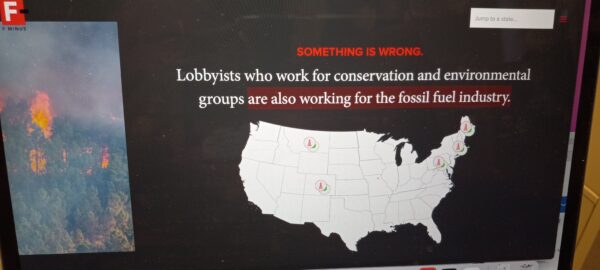National climate group asks: Should Md. lobbying firms take fossil fuel clients?

The city of Baltimore sued ExxonMobil and other petroleum companies in 2018, seeking compensation for environmental degradation attributable to climate change. That lawsuit is grinding its way through the judicial system.
Johns Hopkins University in Baltimore was one of the first big higher education institutions in the U.S. to renounce coal power. The university offers a master’s degree in climate studies, and has taken many steps to reduce its carbon footprint. The university’s top donor, former New York Mayor Michael Bloomberg, is an international climate activist.
The Prince George’s County government has put a far-reaching program in place to reduce greenhouse gas emissions, and in recent years has become an innovator on recycling and stormwater management. The county has also launched a curbside composting program and is building out its electric bus fleet.
What do these three major Maryland institutions working to improve the environment have in common? They have all, in recent years, paid Annapolis lobbyists who also work for the fossil fuels industry.
Baltimore City, Hopkins and Prince George’s are hardly alone. Across Maryland, scores of institutions, nonprofit groups, and even clean energy organizations use State House lobbyists who are also representing fossil fuels interests.

Click here to read more from our Climate Calling series.
In Annapolis, dozens of lobbyists are paid by big energy companies, oil and gas pipeline owners and utilities that use fossil fuels to supply heat and electricity to Marylanders. Every year, energy is one of the most heavily lobbied issues in the General Assembly session.
Most high-priced Annapolis lobbying firms, which usually hire teams of politically savvy generalists, tend to work a range of issues for a broad variety of clients.
But now a new national climate advocacy group is beginning to ask whether major lobbying firms ought to be taking on fossil fuel clients at all — especially if the aims of those clients run counter to the goals of the institutions, nonprofits and clean energy businesses that these lobbyists also represent. This new advocacy group, known as F Minus, is also questioning whether various businesses and organizations of all types ought to be spending their money on lobbying firms that also choose to represent fossil fuel interests.
“The climate crisis is so bad, it’s time to cut ties with these lobbyists,” said James Browning, the executive director of F Minus, which is officially launching its campaign and accompanying website and 50-state database on July 5.
That’s a statement that goes to the very heart of State House advocacy in Annapolis and the lobbying trade more broadly. And it also represents a new frontier in climate advocacy, as activists increasingly target corporate bottom lines in addition to the environmental crisis itself.
Big business
James Browning may be a familiar name to veteran Maryland politicos. From 2001 to 2005, he was executive director of Maryland Common Cause, the good government organization. In 2006, he ran unsuccessfully for a Montgomery County seat in the Maryland House of Delegates. For the past quarter century, Browning has been an advocate for good government, environmental and child policy organizations, working with national, regional and philanthropic groups in Maryland, Washington D.C., and the Philadelphia area, where he lives now.
Browning first became interested in the potential conflict of interest that statehouse lobbyists may face two decades ago, when he noticed that a prominent Maryland lobbyist, Laurence Levitan, who was a former state Senate committee chair, was registered to represent both the American Lung Association, which was pushing for an indoor smoking ban, and the Maryland Auto Dealers Association, whose cars were creating air pollution. That seemed like a contradiction to Common Cause.
Browning recalled that when he made some inquiries, the hazy explanation he got was that “it’s not a problem,” because the lung association at the time was working that session on issues related to indoor air quality, while cars generated carbon emissions outdoors. It seemed implausible to Browning.
But now, Browning believes he has encountered hundreds of similar potential conflicts of interest in all 50 state capitals. That’s what he’s hoping to spotlight with F Minus. The organization has compiled a database of lobbyist registrations in all 50 states, tracking lobbyists and the clients they take on. In Maryland, those registrations can be looked up on the website of the Maryland State Ethics commission, which regulates the lobbying industry.
In Maryland, lobbying state government is big business. According to the ethics commission’s 2022 annual report, businesses, professional associations, labor unions, law firms, educational institutions, government agencies, and advocacy groups spent $71,241,236.38 to influence Maryland lawmakers between Nov. 1, 2021 and Oct. 31, 2022. In that same period, 15 lobbying firms earned $1 million or more, led by Perry White Ross & Jacobson, which took in $6,505,549.86, and Rifkin Weiner Livingston LLC, which earned $5,084,315.99.
A dozen individual State House lobbyists billed $1 million or more during that period, and another 21 billed between $500,000 and $999,999.99.
Dozens of lobbyists represent fossil fuel interests in Annapolis. Several also represent clean energy companies, environmental groups, public health organizations, and institutions that have tried to do their part to reduce greenhouse gas emissions.
In some cases, lobbyists represent both fossil fuel clients and clients working to combat climate change. How can this be?
In Annapolis, as in many state capitals, lobbying firms have a large portfolio of clients. While in Washington, D.C., there is a degree of specialization in the lobbying corps — though some large K Street firms also thrive as generalists — the big money firms in Annapolis are generally populated with lawyers, operatives, and government veterans who have a broad range of political contacts and are able to represent their clients’ interests on just about any issue.
“The model of representing widely divergent interests is more prevalent at the state level than it is at the federal level,” Browning said.
And in Maryland, with a part-time legislature, where lawmakers have small and sometimes inexperienced staffs, the best lobbyists have an inordinate influence on the legislative work product year after year.
A wide array of clients — but not much to say
So what are some of the potential contradictions that F Minus identifies in Maryland?
Consider: Two companies are pushing to build offshore wind energy installations off the coast of Ocean City. One of those companies, Ørsted North America, uses the lobbying firm Rifkin Weiner Livingston LLC, one of the oldest and most powerful lobbying shops in Annapolis. The firm also represents Berkshire Hathaway Energy, an energy company with a broad portfolio of clean energy and fossil fuel businesses. It also represents Colonial Pipeline, an oil pipeline company, and TC Energy, a diverse energy and pipeline company.
Michael V. Johansen, Rifkin’s managing partner, declined to comment. Maddy Voytek, Ørsted’s head of government affairs and market strategy for Maryland, said the company runs “a conflict check every time we hire policy advocates and it is our assessment that these relationships [the Rifkin firm maintains] are appropriate.”
“Achieving our green energy vision requires broad, bipartisan collaboration and diverse experience navigating federal, state and local review processes,” Voytek said. “The U.S. is a unique market, and many of our partners bring critical American energy industry experience to Ørsted in a way that helps achieve our vision. Rifkin Weiner Livingston brings decades of regulatory and legislative experience that has materially advanced offshore wind development in Maryland. These partners also help to educate policymakers about the environmental, economic and societal benefits of green energy to build bipartisan political support for this growing industry.”

It hasn’t launched officially yet, but a new website for climate group F minus is in the works. Image by Josh Kurtz.
Similarly, US Wind, the other company seeking to bring offshore wind energy to the state, has hired the firm Perry White Ross & Jacobson as its Maryland lobbyist. That firm also represents First Energy, a nationwide electric utility company that gets its electricity from a variety of sources; Washington Gas, the regional gas utility; GenOn Mid-Atlantic, a national power producer; and Public Service Enterprise Group, a pipeline company.
Through a hired communications firm, US Wind declined to comment. The lobbying firm also declined to comment.
Two of the dozen registered Annapolis lobbyists contacted by Maryland Matters for this story declined to comment, and two more did not respond to requests for comment over the past two weeks. Several preferred to speak on background, but not for attribution. Many of the lobbyists’ clients also declined to comment.
In fact, the one registered lobbyist who agreed to speak on the record was Sushant Sidh, a principal in the Annapolis firm Capitol Strategies LLC. His firm represents the Maryland Geothermal Association, a clean energy group, but also Covanta Energy LLC, an operator of trash incinerators and gas plants, and Constellation Energy LLC, a gas and electric company with a varied portfolio.
Sidh said his firm runs “an exhaustive conflict check” whenever it signs a new client, and routinely reaches out to other clients that could take an opposing position from the new client.
“If both sides agree that there’s no conflict, we’re free to take on the client and we represent clients based on individual goals,” he said.
Sidh said he understands F minus’ argument about climate change and representing potential polluters, but argued that clean energy technologies aren’t ready for widespread use, meaning fossil fuels must still be part of the energy mix.
“When we talk about climate change, the environment and energy, these are transitional things,” he said. “Some people aren’t comfortable with that. But there needs to be a reasonable time to transition.”
What’s more, Sidh said, Capitol Strategies views its energy clients as valued taxpayers and employers in the Maryland economy, and he suggested that eliminating them all and denying them representation in state government amounted to a “pie-in-the-sky” approach.
Several other lobbyists, declining to speak for attribution either because they weren’t authorized to do so by their firms or because they were uncomfortable airing company policies and practices, offered some of the same observations privately.
Among their takes: That fossil fuel companies deserve representation, just as any entity or legal client does. Most lobbyists said their firms are hired to monitor discrete policy areas for these companies and aren’t involved in setting practices for the businesses. Often enough, they are hired to chase funding opportunities.
Some lobbyists described their firms’ procedures for ensuring there are no conflicts of interest between clients, and two lobbyists who are lawyers said they follow more formal state guidelines for attorney conflicts. Some of the lobbyists said they are reluctant to give up longstanding clients, and said they’re proud to help them navigate the ever-changing legislative and regulatory environment on climate and energy. Others sought to draw distinctions between representing an oil or gas company that is that is drawing fossil fuels from the earth, and a utility or pipeline company that is distributing energy to power plants and consumers.
Still others conceded that F Minus had a point — but asserted that taking an absolutist position on clients and energy producers was at least a decade or more premature, because a full transition to renewable energy is still years away.
“This is not the way the world works,” Sidh said.
Lobbying lineups
Some of the institutions working to address climate change in Maryland have an interesting array of paid advocates.
The Baltimore city government is represented in Annapolis by Gordon Feinblatt, a Baltimore-based law firm that also has a lobbying practice. As recently as 2022, one of the lawyers in the firm, Michael Powell, was registered to represent ExxonMobil, the energy giant that the city sued in 2018 (ExxonMobil this year has been represented in Annapolis by an in-house lobbyist).
Gordon Feinblatt also represents a few other energy concerns, including Calpine Energy Solutions LLC, a geothermal and gas energy generator, and Curtis Bay Energy, operator of the medical waste incinerator in Baltimore. A City Hall spokesperson did not provide a comment. D. Robert Enten, a veteran government relations practitioner with the firm, also declined to comment.
Johns Hopkins University, one of the biggest institutions in Maryland, employs three highly-plugged-in Annapolis shops: Cornerstone Government Affairs, which is part of a national lobbying firm with a presence in Washington, D.C., and in a dozen U.S. cities; Harris Jones Malone; and Manis and Canning Associates. All have some fossil fuel clients.
The university did not provide a comment. The firms either did not comment or did not respond to a request for comment.
Prince George’s County also uses Cornerstone Government Affairs for State House lobbying. That firm’s clients include the American Petroleum Institute; Domtar Corporation, an operator of gas plants; NRG Energy, a giant national company with a broad energy portfolio; and Francis Energy, which began as an oil and gas company but is now focused on developing charging stations for electric vehicles.
Asked whether the county government was uncomfortable with the firm representing fossil fuel clients, Anthony McAuliffe, a spokesperson for County Executive Angela Alsobrooks (D), replied, “It’s common practice for counties, cities, and organizations to hire firms to advocate on their behalf.”
The climate crisis is frequently described as a reckoning — a wake-up call for governments to adopt new policies and for consumers to change their habits in myriad ways. If no one is acting with exigency, how will the looming devastation that climate change is certain to bring ever get addressed? Should such a sense of urgency apply to a tradition-bound, remunerative industry that is as much a fabric of lawmaking in state capitals as the lawmakers themselves?
Browning said that as F Minus prepares to launch, it is mainly seeking “transparency and accountability on these issues,” from statehouse lobbyists in Annapolis and across the country.
This story has been updated to correct information about Laurence Levitan’s lobbying clients in 2003.




 Creative Commons Attribution
Creative Commons Attribution